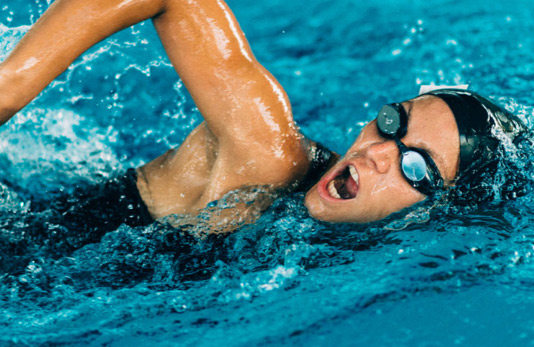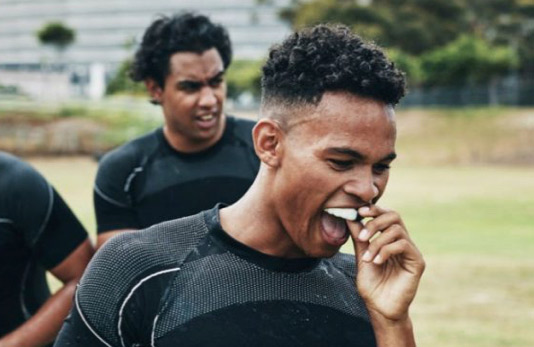All about mouthguards for sports

During a single athletic season, you have a one in 10 chance of suffering a facial or dental injury. In fact, 15 million Americans suffer dental injuries, and 5 million teeth are lost annually in sports-related injuries, according to the American Dental Assistants Association.
So how can you protect your smile? Gear up with a mouthguard before you hit the field or court.
What is a mouthguard?
A mouthguard is a flexible plastic appliance that’s worn during athletic and recreational activities to protect your mouth from injuries. The American Dental Association recommends that people of all ages use a properly fitted mouthguard in any sport that may pose a risk of injury.
Do mouthguards prevent injuries?
Mouthguards can help prevent serious injuries such as brain hemorrhages, unconscious incidents, jaw fractures and neck injuries by helping to avoid situations where the lower jaw gets jammed into the upper jaw. The appliances move soft tissue in the oral cavity away from the teeth, helping to prevent cutting and bruising of the lips and cheeks, especially for those who wear braces.
Which sports require mouthguards?
Any time there’s a strong chance for contact with other participants or hard surfaces, it’s a good idea to wear a mouthguard. If you play baseball, basketball, softball, football, soccer, lacrosse or rugby, or if you participate in wrestling, martial arts or recreational sports like skateboarding, bicycling or in-line skating, you should wear a mouthguard.

Why don't all players wear mouthguards?
Players and parents are sometimes uninformed about the level of contact and potential for serious dental injuries involved with sports. Some, though not all schools or organizations, reinforce the health advantage of mouthguards for contact sports. Cost may be another consideration, although mouthguards come in a variety of price ranges.
What are the different types of mouthguards?
- Stock mouthguards. The lowest cost option, this type offers the least protection because the fit adjustment is limited. It may interfere with speech and breathing because the jaw must be closed to hold it in place. A stock mouthguard is not considered acceptable as a facial protective device.
- Mouth-formed protectors. These mouthguards come as a shell-liner and “boil-and-bite” product. The shell is lined with acrylic or rubber. When placed in an athlete's mouth, the protector's lining material molds to the teeth and is allowed to set.
- Custom-made mouth protectors. Tailor-made by your dentist, this type offers the best protection, fit and comfort because it is made from a cast to fit your teeth. Check your dental plan to see if mouthguards are covered.
How should I care for a mouthguard?
- Clean your mouthguard by washing it with soap and warm (not hot) water.
- Before storing, soak your mouthguard in alcohol-free mouthwash.
- Keep your mouthguard in a well-ventilated plastic storage box when not in use. Make sure the box has several holes so the mouthguard can dry.
- Avoid leaving your mouthguard in direct sunlight or in a hot car.
- Avoid bending your mouthguard when storing.
- Avoid handling or wearing someone else's mouthguard.
- Call your dentist if you have problems with a custom-made mouthguard.
Last updated January 14, 2022
Related articles:
The oral health information on this website is intended for educational purposes only. Always consult a licensed dentist or other qualified health care professional for any questions concerning your oral health.


